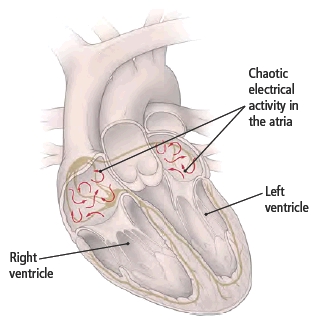Atrial fibrillation is a heart rhythm disorder, in which the heartbeat is rapid and irregular.
The heart is a muscle that has four chambers through which blood flows. The two upper chambers are the atria. The two lower chambers are the ventricles.
Atrial fibrillation affects the atria. Normally, the muscular walls of the atria contract together, pumping blood into the lower two chambers (the ventricles).
In contrast, during atrial fibrillation, instead of one coordinated signal that causes all parts of the atria to pump at the same time, there are multiple uncoordinated signals. Instead of pumping efficiently, the atria just quiver.

As a result, the atria do not pump all of their blood into the ventricles. Also, the ventricles sometimes pump when they dont have much blood in them. So the heart is not pumping efficiently.
In a person with heart failure, the weakened heart is already struggling to pump blood throughout the body. Atrial fibrillation further increases the hearts workload and can worsen heart failure symptoms.
Atrial fibrillation may also cause blood clots to form in the atria, which may break away, move through the bloodstream to the brain, and cause strokes.
If your heart is affected with atrial fibrillation, your doctor may prescribe various medications to slow the heartbeat and thin the blood. In some cases, heart catheter procedures may be recommended to stop atrial fibrillation.


